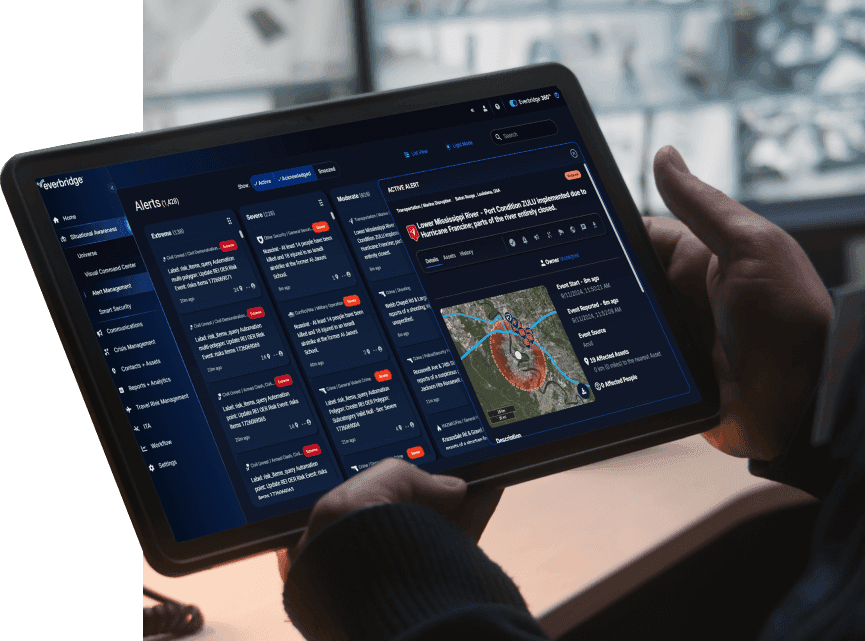Recent years have been marked by a series of critical events that have challenged the resilience of organizations across the globe. From cyberattacks to natural disasters, these events have demonstrated the importance of strengthening organizational resilience. Companies that fail to prioritize resilience and prepare for the unexpected can face severe consequences, including lost revenue, damaged reputation, and even failure.
However, there are critical event management solutions specifically developed to help organizations mitigate the impact of critical events and build resilience, such as those offered by Everbridge. These solutions not only empower leaders to manage the entire lifecycle of critical events, from assessing and responding to performing post-mortem analysis, but also offer a tangible return on investment.
In fact, a 2023 commissioned study conducted by Forrester Consulting found that a composite organization based on interviewed customers using Everbridge CEM experienced a 358% return on investment over a 3-year period. This statistic highlights the crucial role that critical event management solutions play in building organizational resilience and effectively mitigating the impact of unexpected events. Whether they are a result of a disaster or natural causes, Everbridge can help organizations better navigate unpredictable disruptions and reduce impact across operations.
ROI and building resilience
If resilience is the ability to withstand and recover from challenges effectively, then in business terms it only makes sense that building a resilient organization would positively impact ROI.
Take for example building resilient digital systems. Complex IT systems have several failure points, and it only takes one system change to cause a domino effect of failures and outages. Those outages could lead to websites and applications going offline, ecommerce sites no longer taking orders, or end-users being without a crucial service. These events can end up costing the business significantly, be it from the lack of purchases being made, the cost of overtime hours for employees to resolve the issue, or damaging customer relationships that may result in canceled contracts.
But, when the same organization builds resilience into its systems, these events can be minimized if not completely avoided. A digital platform that protects against service issues and alerts on-call responders to areas of concern before they become problems, ensures that the system is always operational. As noted in the Research Behind Resilience, “Decreased costs from IT downtime saved up to two million over three years.”
Key ROIs and VOIs of organizational resilience
Organizational resilience is a critical factor in ensuring a company’s survival and success in today’s unpredictable business environment. In addition to reducing the impact of unexpected events, critical event management solutions can also offer a significant return on investment (ROI) and value on investment (VOI).
ROIs refer to the direct financial benefits that result from investing in resilience programs. These can include savings from reduced downtime, lower costs associated with damage and recovery, and protection of the bottom line. On the other hand, VOIs refer to the less tangible benefits that arise from investing in resilience solutions, such as building a resilient culture, better training for employees, and gaining a competitive advantage.
When investing in resilience, companies can expect to see several key ROIs and VIOs.
Return on Investment
- Reduction in downtime costs
Downtime can have a significant impact on an organization’s revenue, reputation, and customer service. For example, data breaches are a common occurrence affecting organizations and can increase downtime, reducing revenue. With a reliable solution in place, organizations can minimize the duration and severity of downtime in the event of an unexpected event, reducing the impact on operations and costs. - Reduction of recovery time and resources
Resilience solutions can reduce the amount of time and resources required to recover from an unexpected event. This can include reducing recovery time objectives (RTOs) and recovery point objectives (RPOs), as well as minimizing the time required for data backup and restoration. By reducing the time and resources required to recover from unexpected events, organizations can save money and improve their overall operational efficiency. - Reduction of a financial impact
Protecting the bottom line is a crucial part of ROI. Resilience solutions can help protect an organization’s bottom line by minimizing the financial impact of unexpected events. This can include reducing damage costs, minimizing revenue losses, and avoiding the costs associated with lawsuits or regulatory fines. By protecting the bottom line, organizations can ensure their financial stability and continued success. These benefits can help organizations maintain their operational efficiency, financial stability, and competitive advantage in the face of unexpected events.
Value on Investment
- Demonstrate a culture of resilience
Employees today value organizations that demonstrate a commitment to the safety and well-being of their workforce. Investing in resilience solutions helps leaders fulfill their duty of care to their teams by keeping them safe, productive, and empowered to succeed even during critical events. - Enhance training capabilities
Investing in resilience solutions can provide organizations with extensive training modules that enable teams to better manage operations during disruptions. For example, Everbridge provides a hub of over 250+ interactive self-service resources to prepare your team to be confident in their decisions using Everbridge’s critical event management solutions. - Gain a competitive edge
The ability to offer services when competitors cannot is an invaluable advantage. With the help of sophisticated automation, critical event management solutions allow organizations to stay ahead of threats and their competition.
Building organizational resilience is vital to ensure the long-term success of any organization. With Everbridge, businesses can build resilience in all areas of their operations; from digital resilience with products like xMatters, physical resilience with products like Mass Notification and RedSky, and even resilience while on the move with products like Travel Risk Management.
To learn more about the importance of resilience for North American organizations, download the eBook The Research Behind Resilience: Why Prioritizing and Investing in Resilience Matters.

